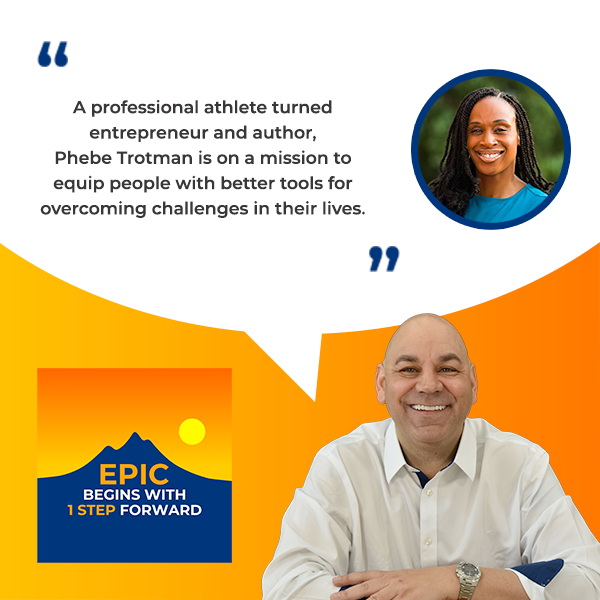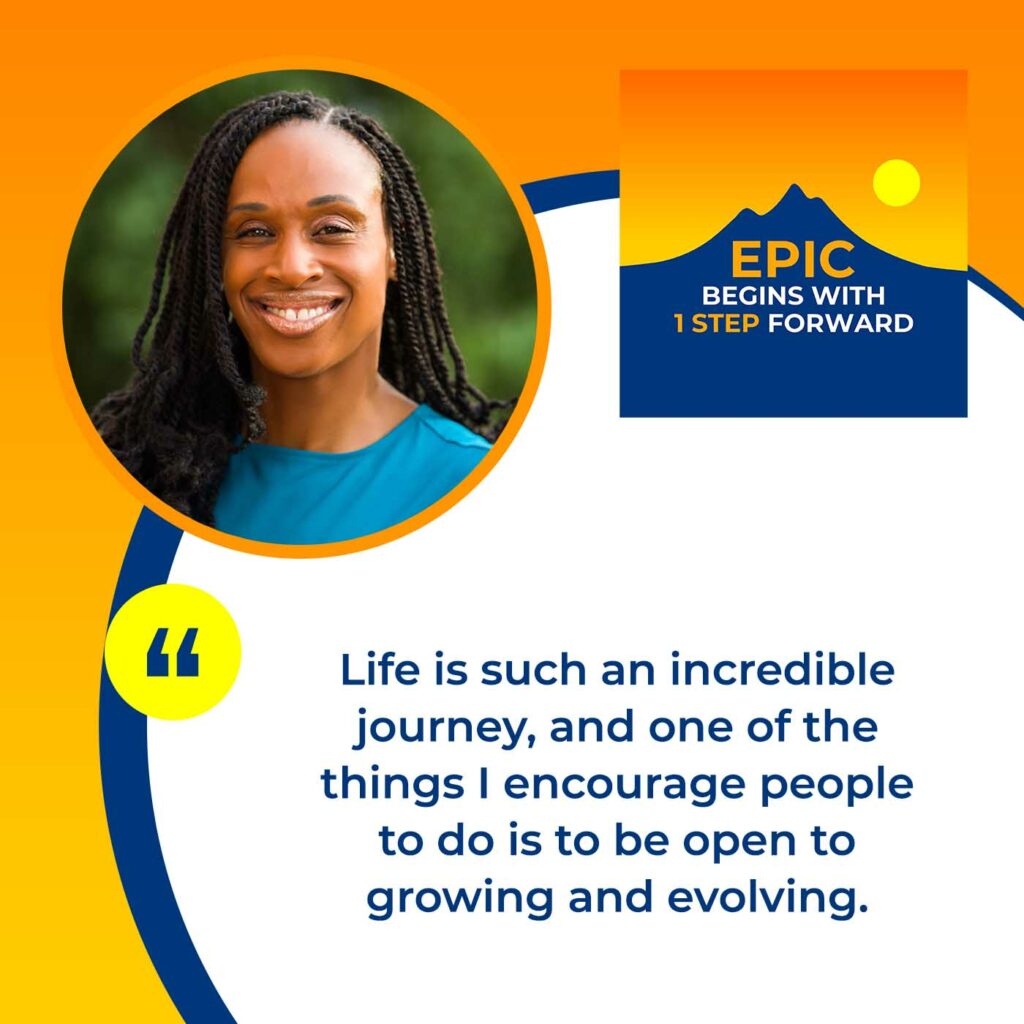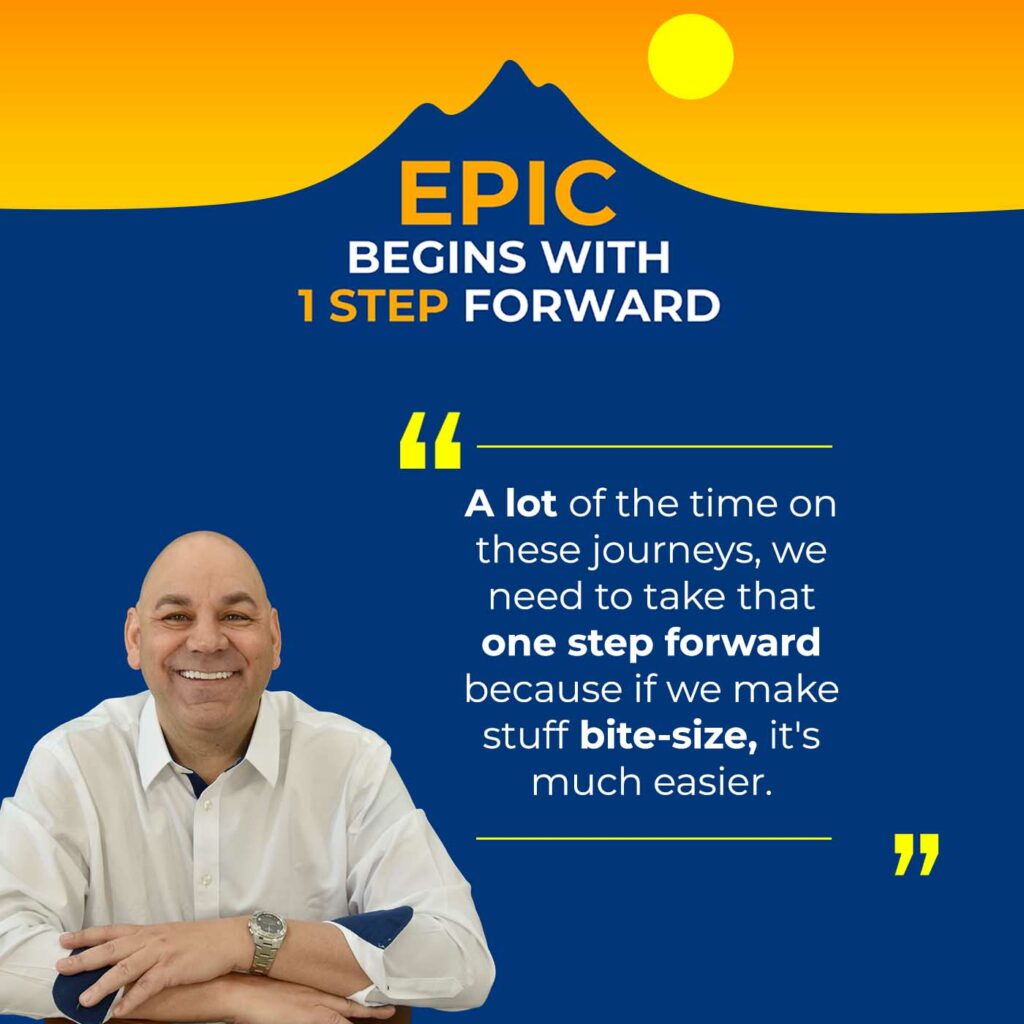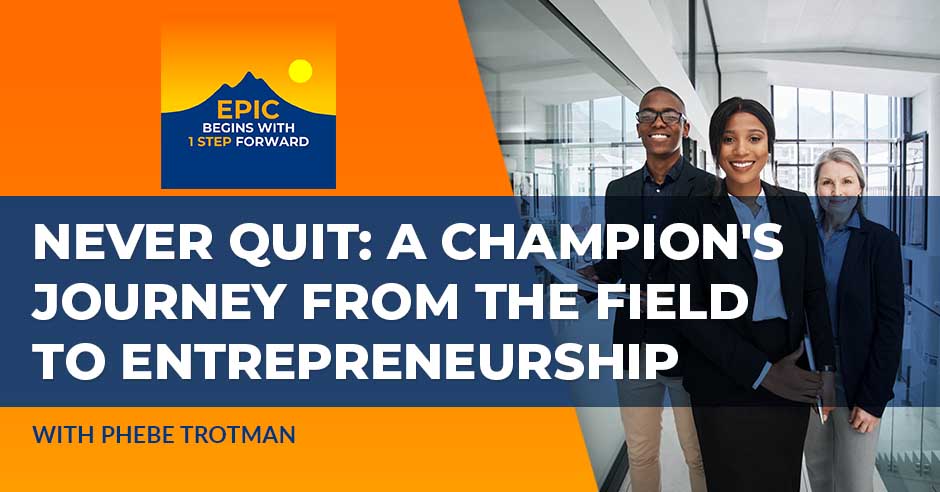Tough days, setbacks, and moments of doubt can leave us feeling discouraged, but what if you could harness those experiences to fuel your growth and become your best self? In this episode, we welcome Phebe Trotman. Phebe is a former professional soccer player turned entrepreneur and author of Never Quit on a Bad Day. Her journey from the soccer field to entrepreneurship is inspiring, and she shares valuable insights on resilience, growth, and pursuing your dreams. Join us as we delve into Phebe’s experiences and learnings that can empower us all on our own journeys.
—
Watch the episode here
Listen to the podcast here
Never Quit: A Champion’s Journey From The Field To Entrepreneurship With Phebe Trotman
In this episode, I am so excited to have Phebe Trotman join me. Phebe, tell us a little about who you are.
First and foremost, Zander, thank you so much for having me on the show. It is an honor to be here with you. I’m super excited for our conversation. I am a soccer player, former professional athlete, turned entrepreneur, and author of Never Quit on a Bad Day, and just having a blast learning and growing on this incredible journey that we’re privileged to have in terms of life. That is in a nutshell. We can unpack a lot of that and it’s been a fun journey. I continue to grow, learn, and help people along the way.
That is so great. I am so excited. Now, I do have to ask because I just released an episode that I did with Angelina Anderson, who is the goalie for Angel City FC. Where did you play soccer in college and professionally? How long did you do that?
I grew up here in Vancouver, Canada. I went to university up here at a school called Simon Fraser University. We played in the NAIA, which was a fun league to play in in the sense that we played a lot of our games in the US. I had a chance to travel there. After university, I had a successful career as a university athlete. I played one season down with the Fort Collins Force and then I played 5 or 6 seasons with the Vancouver Whitecaps when they had a women’s team.
I know there’ve been all these different iterations of women’s professional soccer leagues and stuff. Was it part of that?

It was part of a league called the W-League, which at the time was the highest level of women’s soccer in Canada and the United States. It was part of that league.
Somehow, I seem to get the goalies and professional goalies. When you were playing, did you ever play any level for the Canadian national team like the U18 or U20?
I didn’t end up like that. I played with a lot of teammates who played on the national team, however, on that team.
Epic Memories Of Playing Professional Soccer
What would you say is one of your most epic or 1 or 2 epic memories of playing professional soccer?
I’ve been fortunate. I’ve played on some incredible teams and learned a lot over the journey. I have a long list of accolades in terms of team performance and personal. That being said, there’s been challenging moments. Some of the most epic wins that we won in my last year at university with Simon Fraser were we won the national championship and we played in the longest. This was back then when they had Golden goals. You kept playing until someone scored. We played five overtime periods. It was almost two full soccer games and we ended up winning that game. It was an incredible moment to be.
You all must have been so tired.
Tired and hungry. On one of the overtimes, they have a protein bar because you’re literally giving it. Every moment is so precious. Also, in my first two years at the university, we lost in the final and then in the third year, we didn’t have a great showing. In then the last year, we had a rough rocky start. We had some tough conversations. We turned things around so to come out on top. It was an incredible moment. I can still see and feel the teammates and all of us celebrating when the ball went in the back of the net.
I can imagine the nerves that you were having when they were coming towards you and then you’re like, “Just save the ball. Do whatever.”
I’m a striker so I’m upfront. I was the one who scored the ball.
I thought you were a goalie. I’m sorry.
No.
That’s my bad. For some reason, I thought you were a goalie and I’m like, “I was talking to another goalie.”
I was just thinking in terms of soccer players. No, I’m on the other end.
I don’t know why I thought you played goalie. I saw soccer and I’m like, “Another goalie.” You are a striker. That’s cool. What do you miss most about playing?
I still play. I don’t play at the same level in terms of the league that I used to play, but I do still play. What do I miss most about playing in terms of that professional atmosphere and even university? A big piece of it is that focus in terms of you’re all in. That is what you’re doing. You’re committed to training hard. You’re committed to your nutrition. You’re committed to your sleep, your water, giving it your all, and having that competitive environment where you’re working to be the best athlete and teammate that you can be for your teammates.
Also, you have that collective goal to win a game. I still have that in terms of the environment right now as the team where we’re all working to win a game. However, it’s very different now in the environment that we’re playing in where we have careers. We have families. We have all sorts of things. It’s not that one-track focus if you will. It was a lot of fun. There are so many great memories of road trips and that competitiveness of wanting to be the best so that you can help your team win a game.
Phebe’s Epic Journey
What epic journey are you on now?
As I said in my intro, life is such an incredible journey and one of the things I encourage people is to be open to growing and evolving. To go from playing sports at a high level and then as an entrepreneur, I ended up building a business with a network marketing company. I’m still with that company now. Also, the next epic step forward was releasing the first book of a planned book series.

It’s interesting because you had asked me five years ago, “Is writing a book on your goals?” It wasn’t. However, I always encourage people to be open because in my heart for the last several years, I wanted to create something to help people and inspire them. Also, share some of my experiences as an athlete and as an entrepreneur in life lessons to help people along their own journey.
With a couple of friends of mine, we were talking about what’s next. I said, “I want to help people and inspire them.” They suggested I write a book. Initially, I was a little hesitant because I was like, “I don’t know if that’s the way I feel called to.” With that being said, I did want to create again something to help. The month before that, I had an amazing honor. I was inducted into the Coquitlam Sports Hall of Fame. We had this induction event. In that event, the interviewer asked me, “What has the sport given me?” I shared some of the life lessons and incredible high moments, some of which we talked about in this episode. I also shared the only reason I was able to have some of those incredible highs is because of the lows.
Getting cut from a team, sitting on the bench, coming back from an injury, and pushing through all that to get to the other side. That’s when I got excited about the theme of the book and realized how much it can help people. Even though the challenges may not be the same, the principles and what you can learn you can apply to your life to help people get through those tough times as well.
Phebe, I want to let you know that if you had asked me in college whether I would write a book, I would’ve asked you, “Were you feverish? Were you delusional?” It still blows my mind that I’ve written three books and two of them have been Amazon bestsellers. Never in a bazillion years. I’m a talker, not a typer, but I’m a firm believer that when you want to do something, you figure out the way that’s going to work for you to do what you want to do.
Writing a book is so involved and you have to find the way that is going to work for you and also, help find a team. You don’t write a book completely by yourself because once you put words down on paper, you want someone else to look at it and help you say, “Let’s rephrase this paragraph or something.” It’s because in your mind it’s super clear because you know what you wanted to say, but then someone else reads and goes, “I’m not exactly clear what you were saying here.” I totally get that.
I also like what you said. I talk about it in my EPIC Begins With 1 Step Forward book that failure is part of the journey. We can’t go in and say, “Unless I can do it absolutely perfectly.” As an entrepreneur, I know that I have spent money on tools that are great tools. They’re not the right tool for me but I wouldn’t know that if I didn’t try that tool out or you just made a mistake.
You try something and it doesn’t work. Instead of going, “That’s it. I’m not going to do it.” As you said with playing soccer, you get cut from a team. It is highly disappointing. No one wants to go out and fail but I do believe that it is part of our journey. There’s going to be detours. There’s going to be going to be perceived roadblocks. I want this, but I can’t get them. However, I think sometimes roadblocks are a mirage. We put them in front of ourselves. We tell ourselves what we can’t do.
Yeah, and I think sometimes it’s to see how badly you want something to. A roadblock doesn’t have to be a dead end. A roadblock might be a little bit of a detour or get over the top of that roadblock too, right?
A roadblock doesn’t have to be a dead end. A roadblock might be a little detour.
Absolutely. Sometimes it takes you a little while because of all the ways you think you’d get around, you can’t. I know I was already to do so many things and the pandemic hit. I couldn’t go out and give speeches because you couldn’t leave your house so it’s like, “What do I do?” I don’t know how long this is going on, but I can’t just sit there and go, “I’ll just sit here,” Yeah.
Can I jump in?
Absolutely.
One of the things that’s so powerful because I have been writing about it in the next book series, is “What can I do?” It’s such a powerful phrase and the more as people, we can embrace that even when we do get hit with a roadblock, setback, or whatever you want to call it, asking ourselves, “What can I do,” and doing that thing versus just being blocked. Ask that empowering question because when we ask ourselves that question, our subconscious now starts to go to work. It starts to think of things that you can do to help you.
I wanted to highlight that because I know it’s ingrained in you because that’s what you did. However, I want to make sure our readers get that because that’s such a powerful gem. It’s a question that when we can start asking ourselves. Also, one of the things I write about is, “Can you be that person in your network that when someone comes to you who is like, ‘I can’t do this. I can’t do this,’” to go, “No problem. What can you do?” You ask that question as well too.
Not Yet
I now have three things that I want us to talk about and super. The first thing is, in my book, I have what I think are two incredibly powerful words. It’s not yet. “Phebe, has your next book come out?” “Not yet.” It doesn’t mean that it isn’t coming out. It only means it’s going to take some time. “Did you make the team?” “Not yet.” Again, no is such a hard stop. “Has your book come out?” “No.” It makes it sound like it never will but I love not yet. There are so many not yets.
It’s a gem or just adding yet even when people start to say, “I can’t.” This pops into my head. Someone at the gym, “I can’t do a box jump.” It’s like, “Add yet to the end.” You can’t right now. It doesn’t mean you’re not going to get there. I love that even in terms of an answer. Not yet. It’s brilliant.
To me, there’s so much optimism that I’m working on it. It’s like if you asked a freshman in college. “Do you have your degree?” “Not yet.” Why? It’s because there’s a four-year path that you have to go down. Are you a doctor yet? No, not yet. I’m getting there. Somehow people are like, “I get that. You’re a freshman. Yes, of course, not yet.” You don’t get into university and then in September and October someone goes, “Do you have your degree yet?” “No. I got a long road here.”
We’re talking about roadblocks, detours, and going about your, “What can you do?” I think psychologically, we do something like drive to the gym or drive to work or something. It’s human nature to go, “I know how to do this in there. Here’s how I do it.” We like structure. Human beings like structure. It makes us feel comfortable, but we don’t entertain that there may be alternate routes and detours that will still get us to our destination. It might take longer, but until we’re forced to do so.
I know I used to work in the corporate world and one day, I couldn’t go the two ways I knew to get home because there were big accidents and I had to take an alternate road. I found a completely different and much more beautiful way to get home but I wouldn’t have done it because I never entertained that there was a different way.
I work hard every day to remind myself there isn’t just one way to do it. I don’t know if you have children, but I learned with my children when they were in elementary school that there’s more than one way to do division. In fact, there are four different ways that you could do long division. I couldn’t help them with their homework anymore but my point was I never entertained that there are different ways to come to the same answer.
I think that’s so powerful. What’s an important piece of it is you knew your destination. You knew where you were going. You were going home and you couldn’t get there the same way or the second way so you found another way but there needs to be clarity in terms of where are you headed. That’s one of the things that I talk about and teach people. It’s like, “Do you know what you want to create in terms of what a dream life or dream day looks like for you?”
It’s because if you didn’t have a destination, in your case, home, you can just go a bunch of different ways because it doesn’t matter. You’re going around in circles. I think that’s one of the things that there are different roots. As I said, for myself back in the day, it was like, “I knew I wanted to help people. I wanted to inspire people. I wanted to encourage them along their journey.” I was clear in terms of what I wanted to the end result. How I did it is where I was open to it. I encourage people that you do want to know what is it you want to create. What are you looking to do? How do you do that? That may take a different route. The destination though, needs to be clear too.
A lot of the time on these journeys, we do need to take that one step forward because if we make stuff bite-size, it’s much easier. I’ve been fortunate to run four full marathons. That’s a long way. I haven’t run one in a long time, but yes, I did do it. If I worried about how I was going to be running mile 24 at mile 1, I couldn’t do that. I have to focus on what’s right in front of me. In the same way that you as a striker and in the last five minutes of the fourth quarter, you haven’t even kicked the ball off you.

You don’t know what’s going to go on. None of us do. We get on the journey and we start driving and say, “What’s that going to be like?” I got back from vacation. It was awesome, but I had no idea at the beginning how it was going to go. Did you get up today and go, “I have got the answer to every single thing I will be asked or think about now.” Of course, not.
It Starts With One Step
That’s what I loved about the name of the show, One Step Forward because you’re right. It does start with that one step. Another thing to circle back to what you said in terms of writing a book and having a team, everything is new. When we’re starting something new, it’s like, “We don’t know all the pieces.” Once a decision’s made, then you take one step forward. Now, as you start making those steps forward, you start to see other things that you didn’t see before because you were back there.
It is that process of just continuing to take that one step forward and that’s what gravitated me to the name of your show because we do oftentimes think, “I have to know all these pieces and I have to line everything up.” That’s not necessarily how it works. It does just begin with that single step forward. Do what you need to do, then take the next step forward, the next step forward, and the next step forward. Also, there is clarity when you know where you’re going or where that end destination is. There’s clarity that comes.
I always talk about the marathon training, but I was handed a schedule that made it so much easier. It said, “Go run for 30 minutes.” No problem.” “On Saturday, go run 10 miles.” I’m not saying the 10 miles was easy, but all I had to do was look at my schedule and go, “Okay. I can do that now.” Once I was done, I was done with that training. I didn’t have to keep running all day. I was like, “I did it.” I went on and did the other parts of my day.
One thing that I talk about in the book and you referenced it. I’ll just rephrase it, which is what I call the 97/3 Rule, which is I firmly believe that 97% of our day is really good and up to 3% isn’t as good. Now, on some days, you may have a really bad day and it’s more than 3% but in general, when you talk about people, “I can’t,” or, “I won’t do this.” What was your least favorite subject in school, Phebe?
It’s Physics.
How would you feel if you got a 97 on a physics test?
What?
Exactly. You’d be telling everyone. Would you be focusing on the three points you didn’t get? No. It blows my mind that we, and I’m putting myself in there. Focus on that 3% that didn’t go right and completely ignore the 97% that did go right. It’s not to ignore the 3%, but it’s like, “Let’s keep it in perspective. I wanted to make this phone call. I didn’t make it now. I’ll acknowledge that,” but I did get all this other stuff done. I do an awesome podcast with Phebe.
Let’s focus on what we did get. We both woke up this morning. I’m not trying to be modeling here, but that’s a good thing. It’s a good start. Here we are. We get to do this show. That’s a great thing. All of us are on this journey. We should remind ourselves of how much is going right because I believe so much more is going right than isn’t going.
Look For The Positives
Also, that’s a choice. It comes down to what we want to choose to focus on. We can decide, and unfortunately, we live in a world that gravitates towards the negative. We’re hit with negative influences all the time in terms of just around us. We have to train our minds to look for those positives. We have to train our mind to fill it with more positive stuff. It’s a process. Depending on the environment, everything you grew up in, what you’re reading, what you’re watching, etc., your default might be negative. How do you start switching it to positive?
How do you start adding more inputs that are positive so that your default is looking at the 97% and not the 3% because there are so many things to be grateful for throughout the day to celebrate? We all have wins. I truly believe we’re all champions. We’re champions of our own lives. It’s a choice though of what we want to choose to focus on. Do we choose to focus on the 3% that didn’t go right or do we choose to celebrate the 97% that did go right? That’s what we get to decide every single day.
It is a choice, and choice is so powerful. I think all too often, entrepreneurs or whatever, we go down a path a certain distance and then we’re like, “I got to keep going.” If it’s not working for you, you can choose to change. I know that I’ll wear running shoes. We could say cleats. For you, it’s something that I’m sure you’ve had a few hundred pairs of.
Even though you’re like, “I’ve always worn Adidas. Here’s this year’s iteration of it,” and you put it on and it’s not working. You have to keep wearing it even though it’s not. I’m getting blisters. It’s squeezing my toe. No. You go, this isn’t working. I’m not going to use this anymore. Let me go use something that does work.
I think all too often we get either pride or whatever. “I’ve gone this far to write this chapter and this chapter is just not going.” Pick another choice. Maybe this isn’t a chapter that you should be writing at this time. Maybe you’re feeling more inspired to write the next chapter. Go ahead and do it. No one says you have to write it all. You write it however you want. Think about movies. They don’t shoot movies in the order that we see them. Sometimes the last scene is the first scene that they film.
Again, it comes down to choices, as you said. Also, owning that and being okay with that. Sometimes things do not go exactly as we planned and scripted and that’s part of life as well. It is okay. Part of it is being flexible and adapting to your environment. Again, choosing how you want to respond to the situations that happen in life.
Sometimes, things don’t go exactly as planned. That’s part of life, and that’s okay.
One thing too that popped into my head because it was such a powerful thing that you were talking about is timing. You don’t expect a freshman who goes to university and you’re asking them about their degree that day because you realize there’s time and there’s a process. When we can start to focus on the process versus the result and have consistency in the process, the result will come.
However, there’s also a time. There’s a season for everything. We don’t plant a seed and expect the tree to pop up the next day. If we have a garden, we have to tend to it. As an entrepreneur, there are those times. If we focus on the process more so than the result, then we can celebrate those wins. Celebrate the wins of the process. Celebrate the win that you did pick up the phone call. Celebrate the win that you did and the activity you needed to do to get the result that you’re working towards.
Again, it’s structure. It’s like having a plan, but understanding how you get to your destination, there may be a detour and it may turn out to be a much better road that you’re going down than you originally knew but you have to be open to that, “I’m going to fail at some of this. I just learned a way not to do this.” The only things that we will ever fail at are the things we never try. “I can’t run a marathon.” I didn’t do it fast, but I covered the whole distance. I got it done. You played soccer. You may be like, “I will never finish in the top three of Hurricanes or Suicides or whatever.
They have all different names, but they all have the same results as anyone who’s ever done it. If you don’t know what I’m referencing, it’s soccer, basketball, or any sport where there are lines on whatever you are playing surface is. You start at one end, go up to the first one, and go back. You go up to the second one and go back. They are a favorite conditioning tool coach and they will gas you and you feel terrible.
They’re effective.
Even in that moment of, “I just can’t do two more of these. I got nothing left.” What you don’t see is that it does pay off when you’re in the game.” I don’t know how our time went that fast, Phebe. That’s what happens in the show. If we do take that one step forward, then all of a sudden you’re like, “Look at where we are.” I want to thank you so much for sharing your awesome knowledge and your awesome positivity. I so get it. Where can people find you?
I am on Facebook and Instagram. It’s very simple. I’m @NeverQuitOnABadDay as well as my website. It’s NeverQuitOnABadDay.com.
I do want to remind my readers that if you want to start your own epic journey, you can purchase one of the courses and if you put in EPIC BEGINS as a code, you’ll get $50 off. I also want to remind everyone that epic choices lead to the epic life that you want. I’ll talk to you next time.
Important Links
- Phebe Trotman
- Never Quit on a Bad Day
- Angelina Anderson – Past Episode
- Facebook – Never Quit on a Bad Day
- @NeverQuitOnABadDay – Instagram
About Phebe Trotman
 Phebe Trotman is a heart-centered entrepreneur and accomplished soccer player. She has achieved many accolades as an athlete, including being inducted into several sports halls of fame, winning championship titles, and being recognized as an exceptional athlete. Phebe has also excelled in her career as a network marketer, earning top awards and recognition within her company. Phebe recently released her first book in a planned series, “Never Quit on a Bad Day: Inspiring Stories of Resilience”. Reading it will energize you to overcome your challenges, strengthen you with the tools needed to do it, and invoke your sense of gratitude for your personal journey. Phebe is passionate about personal growth and empowering others to reach their full potential.
Phebe Trotman is a heart-centered entrepreneur and accomplished soccer player. She has achieved many accolades as an athlete, including being inducted into several sports halls of fame, winning championship titles, and being recognized as an exceptional athlete. Phebe has also excelled in her career as a network marketer, earning top awards and recognition within her company. Phebe recently released her first book in a planned series, “Never Quit on a Bad Day: Inspiring Stories of Resilience”. Reading it will energize you to overcome your challenges, strengthen you with the tools needed to do it, and invoke your sense of gratitude for your personal journey. Phebe is passionate about personal growth and empowering others to reach their full potential.

